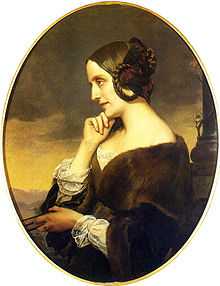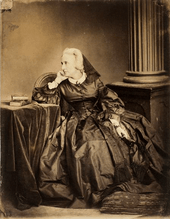Marie d'Agoult

Marie Catherine Sophie, Comtesse d'Agoult (31 December 1805 – 5 March 1876), was a French author, known also by her pen name, Daniel Stern.
Life
Marie was born in Frankfurt am Main, Germany, as Marie Catherine Sophie de Flavigny, the daughter of Alexander Victor François, Vicomte de Flavigny (1770–1819), a footloose émigré French aristocrat, and his wife Maria Elisabeth Bethmann (1772–1847), a German banker's daughter. The young Marie spent her early years in Germany and completed her education in a French convent after the Bourbon Restoration.
She entered into an early marriage of convenience with Charles Louis Constant d'Agoult, Comte d'Agoult (1790–1875) on 16 May 1827, thereby becoming the Comtesse d'Agoult. They had two daughters, Louise (1828–1834) and Claire (1830–1912). They were divorced on 19 August 1835.
From 1835 to 1839, she lived with virtuoso pianist and composer Franz Liszt, who was six years younger, and was then a rising concert star. She became close to Liszt's circle of friends, including Frédéric Chopin, who dedicated his 12 Études, Op. 25 to her (his earlier set of 12 Études, Op. 10 had been dedicated to Liszt). D'Agoult had three children with Liszt; however, she and Liszt did not marry, maintaining their independent views and other differences while Liszt was busy composing and touring throughout Europe.
Their children were:
- Blandine (1835–1862), who was the first wife of future French prime minister Émile Ollivier but died at the age of 26
- Cosima (1837–1930), who first married pianist and conductor Hans von Bülow and then composer Richard Wagner, and
- Daniel (1839–1859), who was already a promising pianist and gifted scholar when he died of tuberculosis.
In 1876, she died in Paris, aged 70, and was buried in Division 54 of Père Lachaise Cemetery.
She was portrayed by Geneviève Page in the 1960 film Song Without End, opposite Dirk Bogarde as Liszt, by Klara Luchko in the 1970 film Szerelmi álmok – Liszt, by Fiona Lewis in the 1975 Ken Russell film Lisztomania, opposite Roger Daltrey as Liszt, and by Bernadette Peters in the 1991 James Lapine film Impromptu, which last dramatized encounters between d'Agoult, Liszt (Julian Sands), Chopin (Hugh Grant), and George Sand (Judy Davis).
Works

Her first stories (Hervé, Julien, and Valentia) were published in 1841-1845. Her best-known work (written as "Daniel Stern") is the Histoire de la révolution de 1848 (appearing from 1850–53, in 3 volumes). D'Agoult's other works include the novel Nélida (1846), Lettres Républicaines in Esquisses morales et politiques (1849, collected articles), Trois journées de la vie de Marie Stuart (1856), Florence et Turin (1862), Histoire des commencements de la république aux Pays-Bas (1872), "A Catholic Mother Speaks to Her Children" (1906, posthumously), and Mes souvenirs (1877, posthumously).
See also
Further reading
- Cronin, Vincent. Four Women in Pursuit of an Ideal. London: Collins, 1965; also published as The Romantic Way. Boston: Houghton Mifflin, 1966.
- Stock-Morton, Phyllis. The life of Marie d'Agoult, alias Daniel Stern. Baltimore: Johns Hopkins University Press, 2000. ISBN 0-8018-6313-9.
References
- A Catholic Mother Speaks to Her Children", De Flavigny, Marie. Catholic Encyclopedia, New Haven, Ct. 1906, Outskirts Press. 2011 edition
- Encyclopedia of 1848 Revolutions
- d'Agoult, Marie (2003) [First published 1846]. Nélida. State University of New York Press. ISBN 0-7914-5912-8.
- Gut, Serge; Bellas, Jacqueline, eds. (2001). Franz Liszt - Marie d’Agoult, Correspondance (in French). Paris: Fayard. ISBN 2-213-61010-X.
- Stern, Daniel (1985) [First published 1851]. Histoire de la révolution de 1848. Balland. ISBN 2-7158-0500-4.
- Stern, Daniel (1859). Esquisses morales; pensées, réflexions et maximes. J. Techener.
- Walker, Alan (1983). Franz Liszt: The Virtuoso Years 1811-1847. Cornell University Press. ISBN 0-8014-9421-4.
- Yates, Jim: Oh! Père Lachaise:Oscar's Wilde Purgatory, Édition d'Amèlie 2007: ISBN 978-0-9555836-1-2. Marie meets Oscar in Purgatory and helps to rescue his soul from eternal torment.
External links
| Wikimedia Commons has media related to Marie d’Agoult. |
- Works by Daniel Stern at Project Gutenberg
- Works by or about Daniel Stern at Internet Archive
-
 "Agoult, Marie Catherine Sophie de Flavigny, Comtesse d'". Encyclopædia Britannica (11th ed.). 1911.
"Agoult, Marie Catherine Sophie de Flavigny, Comtesse d'". Encyclopædia Britannica (11th ed.). 1911.
|